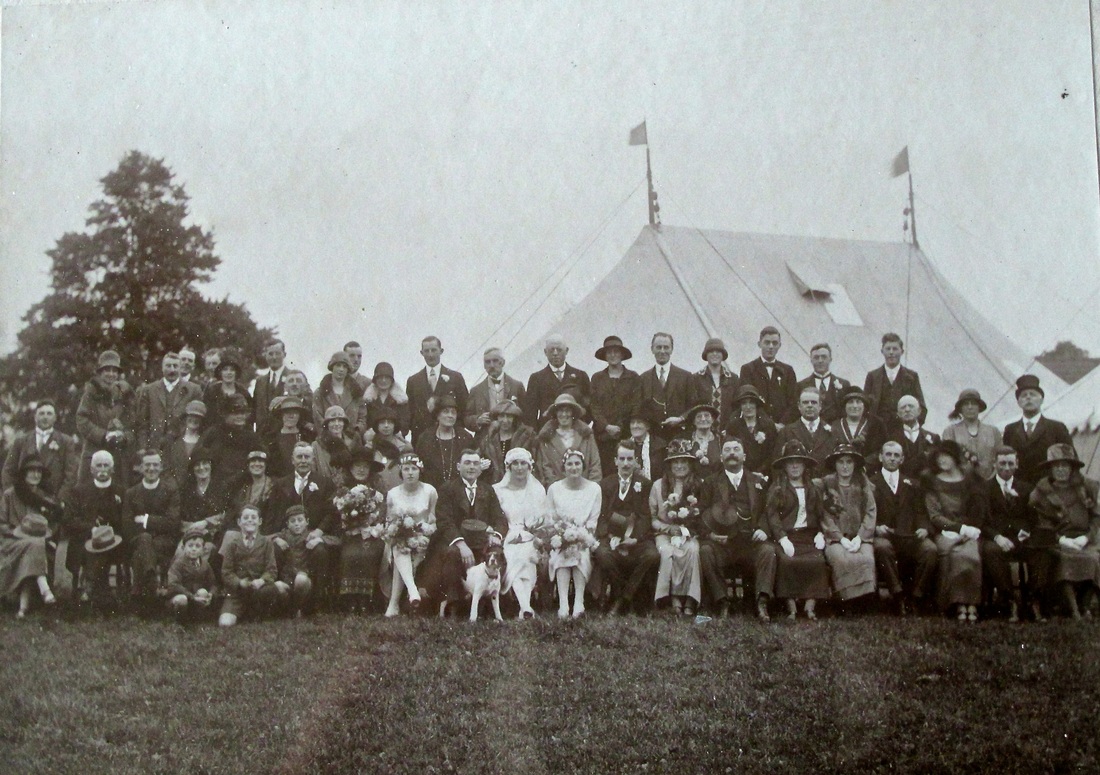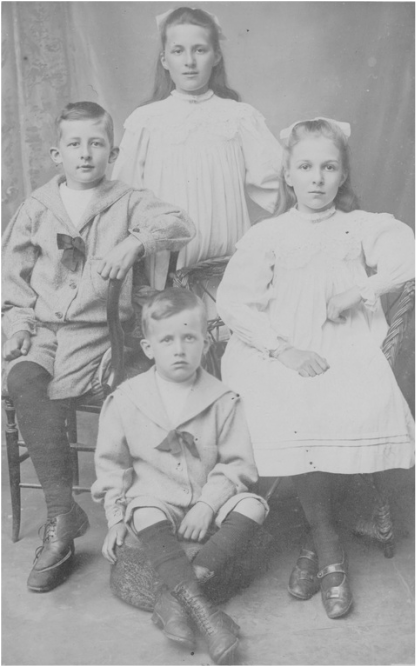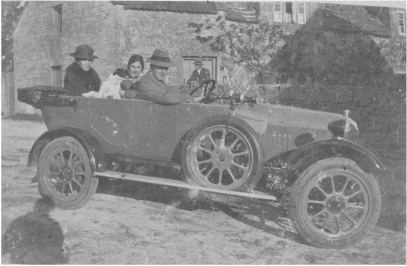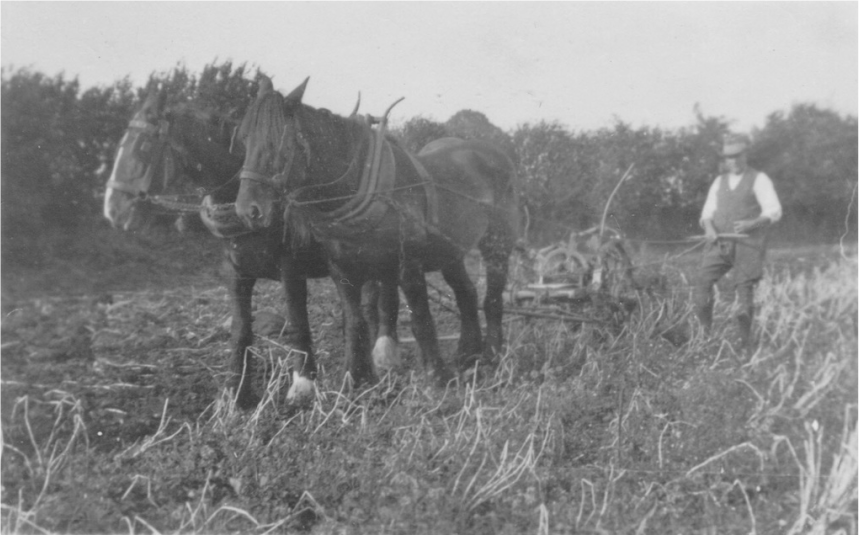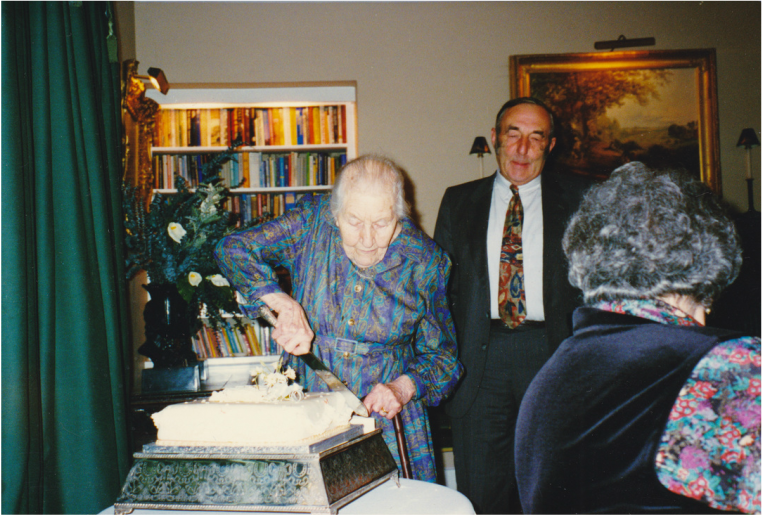Dorothy Mary Isaac (nee Goulstone)
This is about my life by request from my grand-daughters March 1993
This is about my life by request from my grand-daughters March 1993
The women who survived two World Wars in the twentieth century were some of the toughest in history. This is the story of Dorothy Mary Goulstone in her own words, who lived to be 100 years old and was described as one of the nicest people you could wish to meet.
Early Years
I, Dorothy Mary Isaac (nee Goulstone), was born Feb 10 1897 in the reign of Queen Victoria, at Hill House Farm, Box, Wilts, where my nephew John Goulstone and his wife Shirley used to live. My grandfather Thomas came from Keynsham to Hill House to farm with sheep and cattle. It was at a time when Box Railway tunnel was being built by Brunel. My grandfather had heavy cart horses, so he helped to haul some of the stones with which the tunnel was built from the quarries.
After Thomas' death, my father took on the farm. He married my mother in 1896; her home was Arley, Wales.[1] She worked in Bath as a secretary at a butcher's shop. My father went to market in Bath, knew the butcher and that was how they met.
I, Dorothy Mary Isaac (nee Goulstone), was born Feb 10 1897 in the reign of Queen Victoria, at Hill House Farm, Box, Wilts, where my nephew John Goulstone and his wife Shirley used to live. My grandfather Thomas came from Keynsham to Hill House to farm with sheep and cattle. It was at a time when Box Railway tunnel was being built by Brunel. My grandfather had heavy cart horses, so he helped to haul some of the stones with which the tunnel was built from the quarries.
After Thomas' death, my father took on the farm. He married my mother in 1896; her home was Arley, Wales.[1] She worked in Bath as a secretary at a butcher's shop. My father went to market in Bath, knew the butcher and that was how they met.
|
When we think of the home conveniences we have now, life
must have been very hard work then. There was no piped water, it all had
to be pumped by hand from a well in an out-kitchen which was attached
to the house. Cooking was by coal-heated range on which a kettle was
boiled for tea, or by saucepan for hot water.
Hot water for washing was heated in a big boiler by a coal and stick fire underneath. Clothes washing was done by hand in a big tub and then put through a hand-turned mangle. For baths it was a tin bath in front of a fire, filled with hot water carried from the big boiler; no indoor toilet, just a wooden house down the garden path; it improved in time. For cooking there was a four-burner oil stove with oven over part; it was quite good and I remember cooking on it. I had two brothers and two sisters and we had a happy childhood. We could play in the fields and woods in safety and pick wild flowers. I went to school when I was six and my sister seven, taken by an older girl down the lanes to Box village school. When I was thirteen, my sister and another girl went as weekly boarders to a private girls' school in Bath, from Monday morning to Saturday midday. Early Monday morning we walked from the farm to Box Station (which does not now exist), took the train to Bath Station and then by tram to the school. We came home the same way: tram, train then walk up the hill to home; no cars then. I left school when I was sixteen and helped my mother in the house. |
First World War
In June 1914 my sister, Margaret, died of pneumonia; it was a sad loss for me as we always did everything together. The First World War began in August 1914. Classes were started in Box village by the Red Cross for first aid, home nursing and hygiene. I went to these classes and made friends with a lot of girls from the village. We studied hard to pass each subject. I think we enjoyed ourselves for there were dances, whist drives and tennis etc to raise money for comforts for the soldiers. My mother helped on the committee to organise these.
A hospital was set up in Corsham Town Hall for wounded soldiers. Members who had attended and passed the lectures from round Corsham were asked to help the nursing staff. My friends and I took our turn. I went two or three times a week. By then I had a bicycle and I cycled back and forth. I was then twenty. The hospital closed in 1920.
Marriage
I met my husband, William (Bill) Isaac, called by his grand-daughters Papa, at a dance in Chippenham Town Hall in 1921. He lived at Semington and worked with his two brothers on his father's farm. He rode a bike down to see me at Hill House about once a week and after a time he had a motor bike. We were married in 1925 at Box Church and had a reception at the farm. We went down to Bournemouth for four days and then back to Easton Percy to farm, tenants on the Grittleton Estate.
In June 1914 my sister, Margaret, died of pneumonia; it was a sad loss for me as we always did everything together. The First World War began in August 1914. Classes were started in Box village by the Red Cross for first aid, home nursing and hygiene. I went to these classes and made friends with a lot of girls from the village. We studied hard to pass each subject. I think we enjoyed ourselves for there were dances, whist drives and tennis etc to raise money for comforts for the soldiers. My mother helped on the committee to organise these.
A hospital was set up in Corsham Town Hall for wounded soldiers. Members who had attended and passed the lectures from round Corsham were asked to help the nursing staff. My friends and I took our turn. I went two or three times a week. By then I had a bicycle and I cycled back and forth. I was then twenty. The hospital closed in 1920.
Marriage
I met my husband, William (Bill) Isaac, called by his grand-daughters Papa, at a dance in Chippenham Town Hall in 1921. He lived at Semington and worked with his two brothers on his father's farm. He rode a bike down to see me at Hill House about once a week and after a time he had a motor bike. We were married in 1925 at Box Church and had a reception at the farm. We went down to Bournemouth for four days and then back to Easton Percy to farm, tenants on the Grittleton Estate.
|
As part of our wedding present my father and mother gave us a car, which was what we needed to go to Chippenham for market or shopping. The house was in very poor condition. It was Elizabethan. After a year, Sir Audley Neeld of Grittleton House, the landlord, decided to improve it.
A room with a bedroom above was built on and a central staircase instead of two or three stairways was put in. And we had a bathroom with a toilet and piped water, which was pumped by a small diesel engine which was in a small house built at the entrance to the yard. |
Farming Life
For farming, there was very little mechanised machinery in those days. Horses were used for ploughing and hauling on the land. Milking was by hand into a bucket. Corn seed, scattered by hand; hay and straw cut with a scythe and left to dry in the field, then taken in a wagon to a rick yard and made into a rick, which was cut in the winter into big trusses, with a big knife and fed to the cattle. A machine was hired to thresh the corn. Tractors were more general in the 1920s and used for ploughing with bigger ploughs and for general work on the land.
The farm had four cottages, two were down a lane, and across a farm track two were for carters; the two in the lane near the farm were for a milker and general worker. This man was named Porter and had been working on the farm. He carried on with us for many years until he died. His son, Ernest, came when he left school and worked on the farm until he died in 1991 (aged 90); both great workers. We had very little money when we started farming but worked hard and won through.
We had cows which we milked into pails and brought to dairy (attached to the house). We ran the milk over a cooler into churns that were taken by horse and cart to Chippenham's Nestle Milk Factory (now gone). After a few years the milk went to Castle Combe Dairy and was later picked up with their conveyance. A lot of pigs for fattening were in the long house in the orchard. When ready they were sent to the Wiltshire Bacon Factory in Calne or Chippenham. I kept fowls, fed and looked after them, sold the eggs, hatched chickens and reared them.
Your grandfather worked very hard. He used the tractor to do some of the ploughing, planting or reaping with a binder. The sheaves were stacked in a field till dry, carted to the rickyard and made into a rick which was thatched and left until threshed. All this was before the Second World War, when everything changed during and after the war.
My sister, Marion, died in 1936 of liver cancer; my mother died in 1939 of kidney trouble. My first baby boy, Charles, was born in 1928; he was a helpless invalid caused by his birth. With the kind help of many people, your grandfather and I looked after him till he died in 1939, just after the Second World War started.
For farming, there was very little mechanised machinery in those days. Horses were used for ploughing and hauling on the land. Milking was by hand into a bucket. Corn seed, scattered by hand; hay and straw cut with a scythe and left to dry in the field, then taken in a wagon to a rick yard and made into a rick, which was cut in the winter into big trusses, with a big knife and fed to the cattle. A machine was hired to thresh the corn. Tractors were more general in the 1920s and used for ploughing with bigger ploughs and for general work on the land.
The farm had four cottages, two were down a lane, and across a farm track two were for carters; the two in the lane near the farm were for a milker and general worker. This man was named Porter and had been working on the farm. He carried on with us for many years until he died. His son, Ernest, came when he left school and worked on the farm until he died in 1991 (aged 90); both great workers. We had very little money when we started farming but worked hard and won through.
We had cows which we milked into pails and brought to dairy (attached to the house). We ran the milk over a cooler into churns that were taken by horse and cart to Chippenham's Nestle Milk Factory (now gone). After a few years the milk went to Castle Combe Dairy and was later picked up with their conveyance. A lot of pigs for fattening were in the long house in the orchard. When ready they were sent to the Wiltshire Bacon Factory in Calne or Chippenham. I kept fowls, fed and looked after them, sold the eggs, hatched chickens and reared them.
Your grandfather worked very hard. He used the tractor to do some of the ploughing, planting or reaping with a binder. The sheaves were stacked in a field till dry, carted to the rickyard and made into a rick which was thatched and left until threshed. All this was before the Second World War, when everything changed during and after the war.
My sister, Marion, died in 1936 of liver cancer; my mother died in 1939 of kidney trouble. My first baby boy, Charles, was born in 1928; he was a helpless invalid caused by his birth. With the kind help of many people, your grandfather and I looked after him till he died in 1939, just after the Second World War started.
Second World War
Life on the farm was very different during the war. The country was short of food, so farmers had to produce as much as possible. They were ordered to plough every piece of land possible, grow more corn, and pigs, milk and eggs were in great demand. Food was rationed, quite small quantities of butter, meat, sugar, cheese and milk which one bought each week on ration cards. Petrol was rationed so travelling was difficult. All eligible men were called into the services and labour was short on the farm. So everyone had to work during harvest time. I was often called in to help unload hay and corn while the men were milking.
Everyone was in fear of bombs. We could often see or hear the German planes going over to find the Hullavington Airfield. We had one string of bombs dropped across a field near the buildings. As we were near the airfield and in the line of flight, the air ministry made us an air-raid shelter by putting two girders across the kitchen ceiling (they are still there). We slept there all through the war.
Domestic Life
For lighting the house before the war we had an Aladdin lamp, small lamps or candles. The lamps had to be cleaned each day and filled with paraffin oil. For outside and farm buildings it was lanterns which also had to be filled. Then we had our own electricity which your grandfather organised and made with an engine which drove the machinery to make the electric. After the war, the GEC (General Electric Company) brought electricity round over part of the country through cables supported on stanchions which were on some of our fields. So we had electric from that for the house and farm. I cooked with an Aga cooker and, before the Aga, I had an oil stove with four burners and an oven over two burners. Quite good!
Your father was born in 1932, a strong, healthy boy who enjoyed the farm and country. He started school at Kington St Michael, then at Stouts Hill Prep School at Bushey, then passed to go to Dean Close School near Cheltenham. When he left, he came home and helped on the farm till he married in 1958 and took over the farm. Before that in 1951, we had bought the farm. At the time Sir Audley Neeld, the landlord, was selling a lot of his estate. We were then able to put up a large hay barn and another yard.
My father died in 1955, aged 89. When he retired from Hill House Farm, he and my mother bought a nice home with a lovely garden, on the Box Road. After my mother died he continued to live there with a housekeeper. We often went to visit him.
When your father took over the farm, we came to Chippenham and bought the 99 Malmesbury Road house. There was only about six houses nearby then but now there are houses all around. It was a nice house with plenty of room and large garden, which we worked together and grew vegetables and flowers, with a lawn at the back. Your grandfather often went back to the farm to help if needed especially for hay or harvest. He had plenty of interests: he was on the committee of Chippenham Rural District, Young Farmers and also the NF (National Farmers) Union.
I joined the St Paul's Women's Union and at the meetings made many friends. I still belong and go there. When at the farm we went to Leigh Delamere Church but after coming here we went to St Paul's Church, usually on Sunday mornings.
Your grandpa was always interested in ploughing matches and was often asked to judge. Through a friend who went from Grittleton to live near Truro, Cornwall, he was asked to judge at their Cornwall ploughing match. The friend invited us to stay with them. So for three years we went in our Rover 90 and had an enjoyable time while the judging was on. Phyllis motored me round Cornwall, around the coast to the sea places. We usually stayed several days in the autumn.
We also went for short holidays to other places: North Wales, Mid Wales. Scotland, Lake District and South England. Sometimes your uncle and aunt Sylvia joined us. There was no need to book accommodation in those days, we could always find somewhere to stay.
Then in 1969 your grandfather was ill. He went to a specialist who found thyroid trouble. He had several treatments in Bath, but died suddenly in July 1972. He was a good man and husband. We helped each other and were very happy all the time we were together.
Life on the farm was very different during the war. The country was short of food, so farmers had to produce as much as possible. They were ordered to plough every piece of land possible, grow more corn, and pigs, milk and eggs were in great demand. Food was rationed, quite small quantities of butter, meat, sugar, cheese and milk which one bought each week on ration cards. Petrol was rationed so travelling was difficult. All eligible men were called into the services and labour was short on the farm. So everyone had to work during harvest time. I was often called in to help unload hay and corn while the men were milking.
Everyone was in fear of bombs. We could often see or hear the German planes going over to find the Hullavington Airfield. We had one string of bombs dropped across a field near the buildings. As we were near the airfield and in the line of flight, the air ministry made us an air-raid shelter by putting two girders across the kitchen ceiling (they are still there). We slept there all through the war.
Domestic Life
For lighting the house before the war we had an Aladdin lamp, small lamps or candles. The lamps had to be cleaned each day and filled with paraffin oil. For outside and farm buildings it was lanterns which also had to be filled. Then we had our own electricity which your grandfather organised and made with an engine which drove the machinery to make the electric. After the war, the GEC (General Electric Company) brought electricity round over part of the country through cables supported on stanchions which were on some of our fields. So we had electric from that for the house and farm. I cooked with an Aga cooker and, before the Aga, I had an oil stove with four burners and an oven over two burners. Quite good!
Your father was born in 1932, a strong, healthy boy who enjoyed the farm and country. He started school at Kington St Michael, then at Stouts Hill Prep School at Bushey, then passed to go to Dean Close School near Cheltenham. When he left, he came home and helped on the farm till he married in 1958 and took over the farm. Before that in 1951, we had bought the farm. At the time Sir Audley Neeld, the landlord, was selling a lot of his estate. We were then able to put up a large hay barn and another yard.
My father died in 1955, aged 89. When he retired from Hill House Farm, he and my mother bought a nice home with a lovely garden, on the Box Road. After my mother died he continued to live there with a housekeeper. We often went to visit him.
When your father took over the farm, we came to Chippenham and bought the 99 Malmesbury Road house. There was only about six houses nearby then but now there are houses all around. It was a nice house with plenty of room and large garden, which we worked together and grew vegetables and flowers, with a lawn at the back. Your grandfather often went back to the farm to help if needed especially for hay or harvest. He had plenty of interests: he was on the committee of Chippenham Rural District, Young Farmers and also the NF (National Farmers) Union.
I joined the St Paul's Women's Union and at the meetings made many friends. I still belong and go there. When at the farm we went to Leigh Delamere Church but after coming here we went to St Paul's Church, usually on Sunday mornings.
Your grandpa was always interested in ploughing matches and was often asked to judge. Through a friend who went from Grittleton to live near Truro, Cornwall, he was asked to judge at their Cornwall ploughing match. The friend invited us to stay with them. So for three years we went in our Rover 90 and had an enjoyable time while the judging was on. Phyllis motored me round Cornwall, around the coast to the sea places. We usually stayed several days in the autumn.
We also went for short holidays to other places: North Wales, Mid Wales. Scotland, Lake District and South England. Sometimes your uncle and aunt Sylvia joined us. There was no need to book accommodation in those days, we could always find somewhere to stay.
Then in 1969 your grandfather was ill. He went to a specialist who found thyroid trouble. He had several treatments in Bath, but died suddenly in July 1972. He was a good man and husband. We helped each other and were very happy all the time we were together.
Last of the Summer Wine
I continued to live at number 99 with the kind help and support of your father and visits of you grandchildren. Your uncle Frederick Thomas died about the same time so for a long time auntie Sylv and I spent alternate weekends together. I had help in the house for one day a week; first Bessie, who left me through illness, then Mrs Neal who left with bad arthritis. They were both good helpers and kind friends. In the garden I had help once a week from a young unemployed man, Keith, who understood gardening and helped with vegetables and flowers, mowed the lawn and helped with other jobs which I could not do as I got older.
By 1990, I found the house and garden too big, so bought and moved to my present home 3 Long Ridings. It is small but warm and cosy: two bedrooms, toilets and everything here I need. I have a conservatory, now full of plants (I enjoy growing them) a good piece of garden for vegetables and flowers etc. Keith still comes once a week to help me. I was fortunate to sell number 99 house to a young couple who always remember me when I go to see them and show me their alterations and garden.
The newspaper reported on her hundredth birthday as: "Mrs Isaac, who is still in very good health held an open house at her home in the Malmesbury Road area of Chippenham. She has three granddaughters, one living in New Zealand, and five great grandchildren with a sixth due. She spends most of her time reading and watching television with the BBC comedy Last of the Summer Wine one of her favourite programmes."
I continued to live at number 99 with the kind help and support of your father and visits of you grandchildren. Your uncle Frederick Thomas died about the same time so for a long time auntie Sylv and I spent alternate weekends together. I had help in the house for one day a week; first Bessie, who left me through illness, then Mrs Neal who left with bad arthritis. They were both good helpers and kind friends. In the garden I had help once a week from a young unemployed man, Keith, who understood gardening and helped with vegetables and flowers, mowed the lawn and helped with other jobs which I could not do as I got older.
By 1990, I found the house and garden too big, so bought and moved to my present home 3 Long Ridings. It is small but warm and cosy: two bedrooms, toilets and everything here I need. I have a conservatory, now full of plants (I enjoy growing them) a good piece of garden for vegetables and flowers etc. Keith still comes once a week to help me. I was fortunate to sell number 99 house to a young couple who always remember me when I go to see them and show me their alterations and garden.
The newspaper reported on her hundredth birthday as: "Mrs Isaac, who is still in very good health held an open house at her home in the Malmesbury Road area of Chippenham. She has three granddaughters, one living in New Zealand, and five great grandchildren with a sixth due. She spends most of her time reading and watching television with the BBC comedy Last of the Summer Wine one of her favourite programmes."
Conclusion
I think this is enough about my life. I have had so many blessings through the years for which to be thankful. Since your grandfather died, your father has done so much to help and look after me and you granddaughters help me too. So thank you all. And now I have three grand-grand children I find great pleasure in seeing and hearing about them.
Dorothy died in 2001, aged 104.
I think this is enough about my life. I have had so many blessings through the years for which to be thankful. Since your grandfather died, your father has done so much to help and look after me and you granddaughters help me too. So thank you all. And now I have three grand-grand children I find great pleasure in seeing and hearing about them.
Dorothy died in 2001, aged 104.
References
[1] Alhough Dorothy thought that her mother's home was in Wales, the 1891 census shows she was born at Wore, Upper Arley, England, probably in Worcestershire.
[1] Alhough Dorothy thought that her mother's home was in Wales, the 1891 census shows she was born at Wore, Upper Arley, England, probably in Worcestershire.
